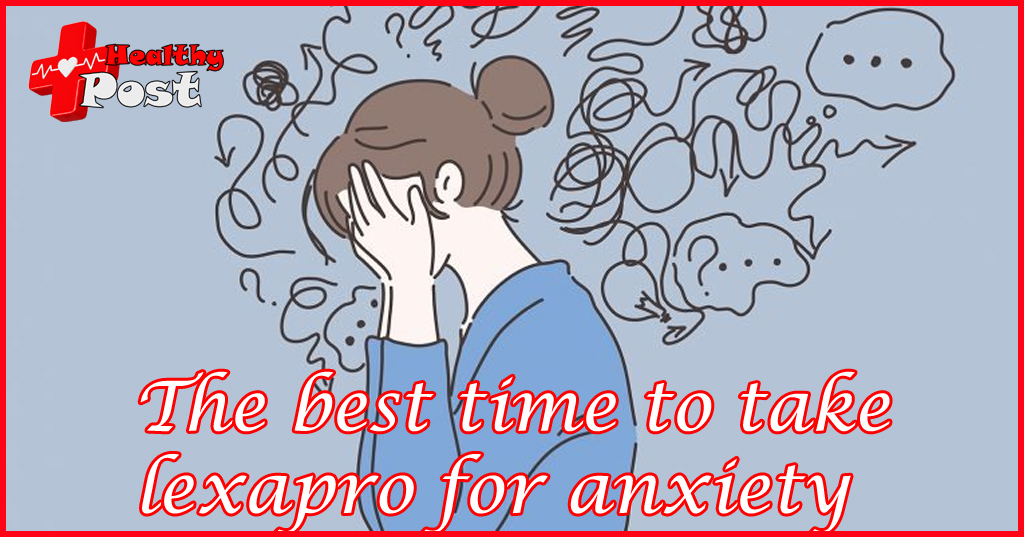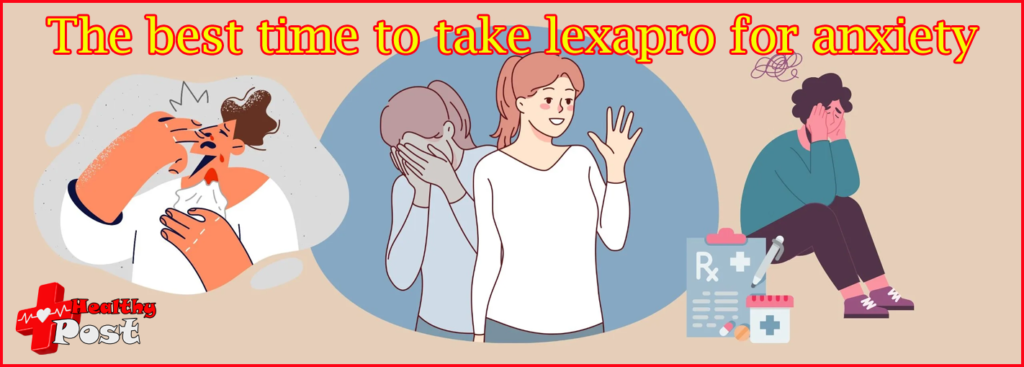
The best time to take lexapro for anxiety
Finding the right approach to managing anxiety can significantly enhance your quality of life. For many, Lexapro (escitalopram) serves as a reliable and effective medication for alleviating symptoms of anxiety and depression. However, one common question among users is: What is the best time to take Lexapro for anxiety?
The timing of your dose can play a crucial role in how well the medication works for you and how easily you manage potential side effects. Lexapro is typically prescribed as a once-daily medication, which makes timing decisions both simple and essential. While some people prefer taking it in the morning to align with their daily routine, others find that an evening dose helps minimize daytime side effects like drowsiness.
This article will explore how the timing of your Lexapro dose can affect its effectiveness and side effects, providing insights to help you make the best decision for your needs. Whether you’re new to Lexapro or looking to optimize your routine, understanding the nuances of when to take your medication can empower you to get the most out of your treatment. Read on to discover what factors to consider and how to find the ideal schedule tailored to your lifestyle.

Understanding Lexapro (Escitalopram)
A. What is Lexapro?
Lexapro, known by its generic name escitalopram, is a selective serotonin reuptake inhibitor (SSRI) commonly prescribed for mental health conditions. As an SSRI, Lexapro increases the availability of serotonin, a neurotransmitter that plays a key role in regulating mood and anxiety. This makes it a widely recommended treatment for generalized anxiety disorder (GAD) and major depressive disorder (MDD).
Approved by the U.S. Food and Drug Administration (FDA) in 2002, Lexapro has gained recognition for its efficacy in alleviating symptoms of anxiety and depression. It is often prescribed due to its favorable side-effect profile compared to other medications in its class. Lexapro is typically taken as a once-daily oral tablet or liquid solution, making it convenient for consistent use.
B. How Lexapro Works for Anxiety
Lexapro works by increasing serotonin levels in the brain, which helps stabilize mood and reduce feelings of anxiety. This mechanism involves blocking the reabsorption (reuptake) of serotonin into nerve cells, allowing for more serotonin to remain available in the synaptic spaces where it can effectively transmit signals.
Patients using Lexapro often experience reduced anxiety symptoms, improved mood, and better overall functioning. However, like all medications, it comes with potential side effects, including nausea, fatigue, or changes in sleep patterns. Consulting with a healthcare provider ensures the benefits outweigh any risks.
Factors Influencing the Best Time to Take Lexapro
A. Personal Schedule and Consistency
Consistency is key when taking Lexapro. To maximize its effectiveness, it’s crucial to take the medication at the same time every day. This helps maintain steady levels of the drug in your bloodstream, promoting better management of anxiety symptoms. Whether you choose to take Lexapro in the morning or evening, aligning it with a time that fits seamlessly into your daily routine ensures you’re less likely to miss a dose.
To help you remember, consider pairing your medication with a daily habit, such as brushing your teeth or eating breakfast. Using tools like alarms, smartphone reminders, or medication organizers can also help reinforce consistency and prevent lapses in your treatment schedule.
B. Side Effects and Individual Reactions
Side effects can influence the best time to take Lexapro. For instance, some individuals experience drowsiness or fatigue as a side effect, making an evening dose preferable to avoid interference with daily activities. Conversely, if Lexapro causes insomnia or restlessness, taking it in the morning may help minimize disruptions to sleep.
Listening to your body and observing how you react to the medication is essential. If you’re uncertain about adjusting your timing, consult with your healthcare provider to tailor your dosage schedule to suit your specific needs and lifestyle.
Morning vs. Evening: Pros and Cons
A. Taking Lexapro in the Morning
Taking Lexapro in the morning can be beneficial for individuals who experience insomnia as a side effect of the medication. Aligning your dose with your daily routine may also make it easier to remember, particularly if combined with morning habits like breakfast or brushing your teeth.
However, some people report experiencing drowsiness or fatigue during the day, which could interfere with work or daily activities. Night sweats may also occur, leading to disrupted sleep despite taking the medication early in the day.
B. Taking Lexapro in the Evening
Evening dosing can be advantageous for those who find Lexapro helps them relax and improves sleep. It may also reduce daytime anxiety, as the medication’s effects carry through to the next day.
On the flip side, taking Lexapro at night may lead to grogginess or fatigue upon waking. For some, evening doses may cause insomnia, potentially disrupting the very sleep they aim to improve.
Expert Recommendations and Clinical Guidelines
A. Advice from Healthcare Professionals
Doctors and pharmacists often recommend starting Lexapro based on your lifestyle and reactions. They may suggest morning doses for individuals prone to insomnia or evening doses for those experiencing daytime fatigue. Regardless of timing, consistency in taking the medication daily is emphasized.
B. Clinical Studies and Research
Research on Lexapro’s timing shows minimal differences in overall effectiveness between morning and evening doses, but individual responses vary widely. Some studies suggest that aligning timing with side effect management can improve adherence and patient satisfaction. Ultimately, healthcare providers recommend tailoring the schedule to your needs and monitoring how your body reacts to adjustments.
Personalizing Your Lexapro Routine
A. Assessing Your Needs
Personalizing your Lexapro routine begins with a thorough evaluation of your daily schedule and lifestyle. Consider the demands of your work, family, and personal activities, as well as the times when you feel most relaxed and focused.
It’s equally important to reflect on how Lexapro affects you. Are you experiencing drowsiness, restlessness, or other side effects? Tracking these patterns can help you determine whether morning or evening doses better align with your body’s reactions. Journaling your experiences or using a symptom tracker can provide valuable insights to share with your healthcare provider.
B. Making Adjustments
Switching the time you take Lexapro requires care and gradual transitions to avoid disrupting its steady effects. If you’re moving from morning to evening, start by taking the medication a few hours later each day until you reach your desired time. Similarly, if switching to mornings, gradually shift the dose earlier.
During this adjustment period, closely monitor how your body responds, and consult your healthcare provider if any issues arise. They can provide tailored advice to ensure a smooth transition. Ultimately, the best time to take Lexapro is one that fits seamlessly into your routine and minimizes side effects, allowing you to focus on your overall well-being.

Managing Side Effects and Maximizing Benefits
A. Coping with Common Side Effects
Lexapro, like many medications, can cause side effects that may vary from person to person. Understanding how to manage these effects can enhance your experience with the medication:
- Drowsiness: If Lexapro makes you feel tired during the day, consider switching to an evening dose, ensuring it doesn’t interfere with daily activities.
- Insomnia: For those struggling with sleep disturbances, a morning dose may help minimize nighttime restlessness. Creating a bedtime routine, such as reducing screen time and practicing relaxation techniques, can also promote better sleep.
- Night Sweats: Wearing breathable fabrics and maintaining a cool bedroom environment can alleviate discomfort from night sweats.
If side effects persist or worsen, it’s important to consult your healthcare provider. They may adjust your dosage, recommend a different timing, or explore alternative treatments.
B. Enhancing the Effectiveness of Lexapro
While Lexapro can significantly reduce anxiety symptoms, its effectiveness is often amplified when combined with healthy lifestyle changes and complementary therapies:
- Lifestyle Changes: Regular exercise, a balanced diet, and stress management practices like mindfulness or yoga can improve overall mental health and support Lexapro’s benefits.
- Therapy and Support: Combining medication with therapy, such as cognitive-behavioral therapy (CBT), can address the root causes of anxiety and teach coping strategies for long-term well-being.
Adopting a holistic approach helps maximize the benefits of Lexapro while improving your overall quality of life. Always work closely with your healthcare provider to develop a personalized plan tailored to your needs.
Conclusion
Summary of Key Points
When it comes to taking Lexapro for anxiety, timing can make a difference in how well the medication fits into your life. Consistency is essential—taking it at the same time every day helps maintain stable levels in your system. Choosing between morning and evening dosing depends on your lifestyle and how your body reacts to the medication. Adjusting the timing to manage side effects like drowsiness, insomnia, or night sweats can improve your overall experience. Combining Lexapro with healthy habits, therapy, and support can further enhance its benefits.
Final Thoughts
Finding the best time to take Lexapro is a personal journey that requires patience and attention to your body’s signals. What works for one person may not be ideal for another, so it’s important to remain flexible and open to adjustments. Don’t hesitate to consult your healthcare provider for guidance—they can provide tailored advice to ensure your treatment is as effective and comfortable as possible.
Remember, the goal is to improve your well-being and empower you to manage anxiety effectively. With the right approach, Lexapro can be a valuable tool in your journey toward a healthier, more balanced life.


17 thoughts on “The best time to take lexapro for anxiety”